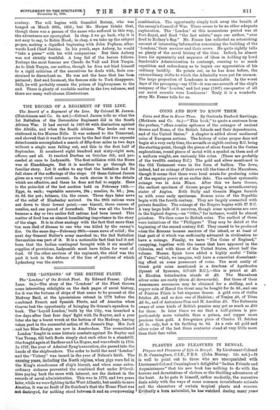THE RECORD OF A REGIMENT OF THE LINE. The Record
of a Regiment of the Line. By Colonel lkt. Jacson. (Hutchinson and Co. 6s. net.)—Colonel Season tells us what the 1st Battalion of the Devonshire Regiment did in the South African War. It had served in 1897-98 with distinction against the Afridis, and when the South African War broke out was stationed in the Murree Hills. It was ordered to the Transvaal, and showed that it was fit for service by the fact that two separate detachments accomplished a march of fifty-four miles in two days without a single man falling out, and this in the first half of September. It numbered eight hundred and sixty-eight men, officers and all. It reached Durban on October 5th, and pro- ceeded at once to Ladysmith. The first collision with the Boers was at Elandslaagte. But it is needless to go through the familiar story. Let it suffice to say that the battalion had its full share of the sufferings of the siege. Of these Colonel Jacson gives us a very vivid account. In such stories it is the details which are effective, and these he does not fail to supply. Here is the price-list of the last auction held on February 14th :— Eggs, 4s. each; vegetable marrows, 28e.; mealies, 35. 8d.; jam, Ss. fid. the pot; tobacco, lls. the ounce. Three days later news of the relief of Kimberley arrived. On the 28th rations were ent down to their lowest point,—one biscuit, three ounces of mealies, and one pound of horseflesh. This was all the harder because a day or two earlier full rations had been issued. This matter of food has an almost humiliating importance in the story of the siege. It is in close analogy with the fact that more than 'ten men died of disease to one who was killed by the enemy's fire. On the same day—February 28th—came news of relief ; the next day General Buller's army marched in; the 2nd Battalion Devonshire was part of it. It is a noticeable fact that had it not been that the Indian contingent brought with it six months' supplies of provisions, Ladysmith must have fallen for want of food. Of the other services of the regiment, the chief was the part it took in the defence of the line of positions of which Lydenberg was the centre.
































































 Previous page
Previous page